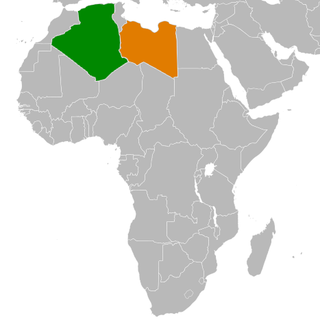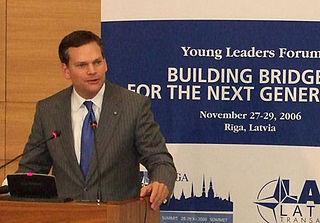
The politics of Libya has been in an uncertain state since the collapse of the Libyan Arab Jamahiriya in 2011 and a recent civil war and various jihadists and tribal elements controlling parts of the country. On 10 March 2021, the interim Government of National Unity (GNU), unifying the Second Al-Thani Cabinet and the Government of National Accord was formed, only to face new opposition in Government of National Stability, until Libyan Political Dialogue Forum assured the ongoing ceasefire.

Saif al-Islam Muammar al-Gaddafi is a Libyan political figure. He is the second son of the late Libyan leader Muammar Gaddafi and his second wife Safia Farkash. He was a part of his father's inner circle, performing public relations and diplomatic roles on his behalf. He publicly turned down his father's offer of the country's second highest post and held no official government position. According to United States Department of State officials in Tripoli, during his father's reign, he was the second most widely recognized person in Libya, being at times the de facto prime minister, and was mentioned as a possible successor, though he rejected this. An arrest warrant was issued for him on 27 June 2011 by the International Criminal Court (ICC) for charges of crimes against humanity against the Libyan people, for killing and persecuting civilians, under Articles 7(1)(a) and 7(1)(h) of the Rome statute. He denied the charges.

The Third International Theory was the style of government proposed by Muammar Gaddafi in the early 1970s, on which his government, the Great Socialist People's Libyan Arab Jamahiriya, was officially based. It was partly inspired by Islamic socialism, African nationalism and partly by the principles of direct democracy.
The Livingston Group (TLG) is the lobbying firm founded by former Congressman Bob Livingston in 1999 after he stepped down as Speaker-elect and resigned his seat. TLG describes its services on its official website, saying it provides comprehensive public affairs, government relations and lobbying services on a global basis. Recognized as one of the most respected bipartisan government relations firms in Washington, D.C., TLG also provides marketing services and public affairs counsel in the areas of coalition building and strategic communications.

Muammar Gaddafi became the de facto leader of Libya on 1 September 1969 after leading a group of young Libyan Army officers against King Idris I in a bloodless coup d'état. After the king had fled the country, the Revolutionary Command Council (RCC) headed by Gaddafi abolished the monarchy and the old constitution and established the Libyan Arab Republic, with the motto "freedom, socialism and unity".

Lobbying in the United States describes paid activity in which special interest groups hire well-connected professional advocates, often lawyers, to argue for specific legislation in decision-making bodies such as the United States Congress. It is a highly controversial phenomenon, often seen in a negative light by journalists and the American public, with some critics describing it as a legal form of bribery, influence peddling, and/or extortion. While lobbying is subject to extensive and often complex rules which, if not followed, can lead to penalties including jail, the activity of lobbying has been interpreted by court rulings as constitutionally protected free speech and a way to petition the government for the redress of grievances, two of the freedoms protected by the First Amendment of the Constitution. Since the 1970s, lobbying activity has grown immensely in the United States in terms of the numbers of lobbyists and the size of lobbying budgets, and has become the focus of much criticism of American governance.
The Jack Abramoff CNMI scandal involved the efforts of Jack Abramoff, other lobbyists, and government officials to change or prevent, or both, Congressional action regarding the Commonwealth of the Northern Mariana Islands (CNMI) and businesses on Saipan, its capital, commercial center, and one of its three principal islands.
The Arab lobby in the United States is a collection of formal and informal groups and professional lobbyists paid directly by Arab governments or Arab citizens in the United States that lobby the public and government of the United States on behalf of Arab interests and/or on behalf of Arab Americans in the United States.

The Podesta Group was a lobbying and public affairs firm based in Washington, D.C. It was founded in 1988 by brothers John and Tony Podesta and has previously been known as Podesta Associates, podesta.com and PodestaMattoon. John Podesta left the firm in 1993, and Tony Podesta left the firm on October 30, 2017, after finding out about increased scrutiny of the firm. It has essentially ceased to exist since then. The firm reorganized in January 2007 after chairman Tony Podesta split with former business partner Dan Mattoon.

Monitor Deloitte is the multinational strategy consulting practice of Deloitte Consulting. Monitor Deloitte specializes in providing strategy consultation services to the senior management of major organizations and governments. It helps its clients address a variety of management areas, including: Organic Growth, Strategic Transformation, Innovation and Ventures, Business Design and Configuration, Strategic Sensing and Insight Services.

Libya–Russia relations are the bilateral relations between the State of Libya and the Russian Federation. Russia has an embassy in Tripoli, with Libya having an embassy in Moscow. Diplomatic contact between Russia and Libya has generally been close and productive, seeing as both countries have had and continue to see volatile relations with the United States. Former Libyan leader Muammar al-Gaddafi was a close ally of the Soviet Union, despite his country's membership in the Non-Aligned Movement. Russia also regards Libya as one of its strongest allies in the Arab world, and has supported stabilization of the country following the aftermath of the Libyan Civil War. After the outbreak of new conflict, Russia has primarily backed the Tobruk-based House of Representatives over the UN-backed Government of National Accord and various other factions.

Relations between Algeria and Libya are considerably strained by tensions between the revolutionary National Transitional Council (NTC) of Libya and the single-party autocracy of President Abdelaziz Bouteflika of Algeria. Bilateral relations were generally amicable during Muammar Gaddafi's 42-year rule of Libya.

Stephen Prentiss Payne is an American lobbyist from Houston, Texas. He has also served as a governmental, energy, international affairs, and international business development consultant, corporate and political adviser, foreign diplomat, businessman, fundraiser, and former adviser to two of the United States Department of Homeland Security's Advisory Committees—the Secure Borders and Open Doors Advisory Committee (SBODAC) and the Essential Technology Task Force (ETTF), in connection with which he held a U.S. security clearance.

United Nations Security Council Resolution 1970 was a measure adopted unanimously by the UN Security Council on 26 February 2011. It condemned the use of lethal force by the government of Muammar Gaddafi against protesters participating in the Libyan Civil War, and imposed a series of international sanctions in response.
The Turkish lobby in the United States is a lobby that works on behalf of the Turkish government in promoting that nation's interests with the United States government.
The LSE–Gaddafi affair was a scandal in the United Kingdom that occurred as a result of relationship that existed between the London School of Economics (LSE) and the Libyan government and its leader Muammar Gaddafi and his son Saif al-Islam Gaddafi.
The Pakistan lobby in the United States refers to the professional lobbyists paid directly by the government of Pakistan to lobby the public and government of the United States on behalf of Pakistani interests and/or on behalf of Pakistani American rights and interests.
The Egypt lobby in the United States is a collection of lawyers, public relation firms and professional lobbyists paid directly by the government of Egypt to lobby the public and government of the United States on behalf of the interests of the government of Egypt.

From 1969 to early 2011, the politics of Libya were determined de facto by Muammar Gaddafi, who had been in power since his overthrow of the Kingdom of Libya in 1969.
The international reactions to the death of Muammar Gaddafi concern the responses of foreign governments and supranational organisations to the killing of former Libyan leader Muammar Gaddafi at the Battle of Sirte, the last major engagement of the Libyan Civil War, on 20 October 2011.










